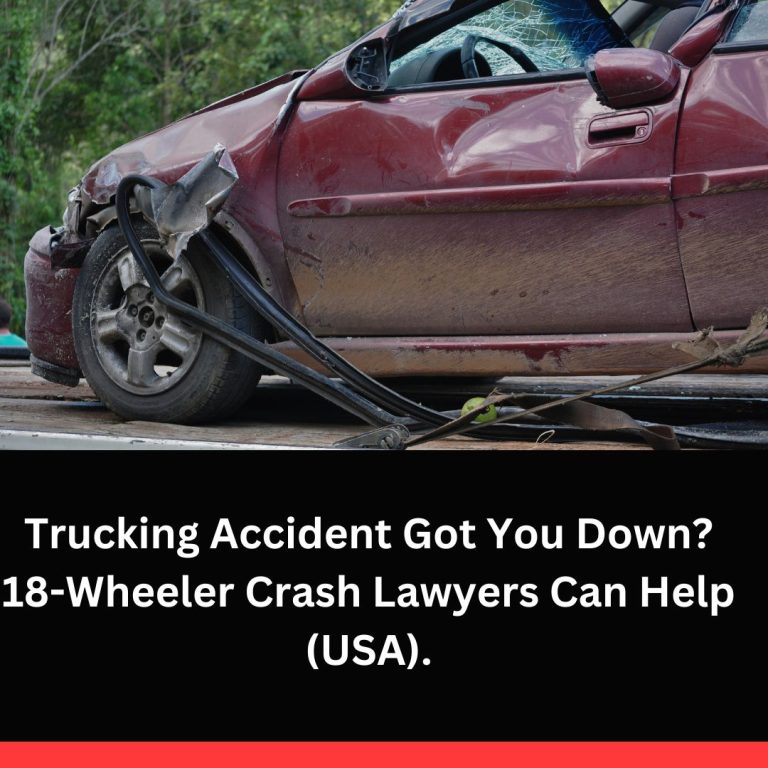The trucking industry is the backbone of the American economy, keeping store shelves stocked and goods moving across the country. But operating a commercial vehicle (CMV) comes with a whole lot of rules and regulations set by the Federal Motor Carrier Safety Administration (FMCSA).
These rules are there to keep everyone safe on the roads, but navigating them can feel like a never-ending maze.
If you’re a trucker or own a trucking company facing an FMCSA compliance issue, it can be stressful and confusing. Don’t worry, you’re not alone.
This article will explain what FMCSA compliance means, common problems truckers face, and how a commercial vehicle lawyer can help you fight for your rights.

What is FMCSA Compliance?
The FMCSA is a federal agency under the Department of Transportation (DOT) responsible for ensuring safety on America’s roadways for commercial motor vehicles. They do this by setting and enforcing regulations for things like:
- Driver qualifications: Who can drive a commercial truck and what training do they need?
- Vehicle maintenance: How often must trucks be inspected and repaired?
- Hours of service (HOS): How many hours can a driver work before needing a break?
- Cargo securement: How should loads be safely fastened to the trailer?
- Drug and alcohol testing: How are truck drivers tested for substance abuse?
These are just some examples, and the FMCSA rulebook is quite extensive. Staying on top of all these regulations can be a full-time job, and even experienced truckers can run into trouble.
Common FMCSA Compliance Issues for Truckers
Here are some of the most common problems truckers face with FMCSA compliance:
- Hours of service violations: Violating HOS rules is a major concern. Driving while fatigued can be extremely dangerous, and the FMCSA strictly enforces these regulations with electronic logging devices (ELDs) installed in most trucks.
- Logbook violations: Before ELDs, drivers had to keep paper logs of their duty time. Filling these out incorrectly can lead to fines.
- Weight limit violations: Trucks have weight limits they can’t exceed to prevent damage to roads and bridges. Overweight trucks can be pulled over and fined.
- Vehicle maintenance violations: Trucks need regular maintenance to stay safe. Failing to properly maintain your vehicle can result in fines and even getting your truck taken out of service.
- Drug and alcohol violations: Driving under the influence of drugs or alcohol is a serious offense for anyone, but especially for commercial truck drivers. A positive drug test can lead to license suspension or revocation.
- Accidents: Accidents happen, but the FMCSA will investigate any involving a commercial vehicle to determine if there were compliance issues that contributed.
The Consequences of FMCSA Non-Compliance
Not following FMCSA regulations can have serious consequences, including:
- Fines: Fines for FMCSA violations can range from hundreds to thousands of dollars, depending on the severity of the offense.
- Out-of-service orders: If your truck is found to be unsafe, the FMCSA can order it to be taken out of service until it’s repaired. This can be a major financial blow for trucking companies.
- License suspension or revocation: In serious cases, the FMCSA can suspend or revoke a driver’s commercial driver’s license (CDL), effectively putting them out of work.
- Increased insurance rates: FMCSA violations can lead to higher insurance premiums for truckers and trucking companies.
How a Commercial Vehicle Lawyer Can Help
If you’re facing an FMCSA compliance issue, don’t try to go it alone. A commercial vehicle lawyer can be a valuable asset in your fight. Here’s what they can do for you:
- Understand the charges: FMCSA regulations can be complex, and a lawyer can help you understand the specific charges you’re facing and the potential consequences.
- Gather evidence: A lawyer can help you gather evidence to support your case, such as witness statements, maintenance records, and data from your ELD.
- Negotiate with the FMCSA: In many cases, a lawyer can negotiate with the FMCSA on your behalf to reduce fines or penalties.
- Represent you in court: If your case goes to court, a lawyer can represent you and fight for your rights.
- Help you avoid future violations: A lawyer can help you understand the FMCSA regulations better and develop strategies to avoid future violations.
Finding the Right Commercial Vehicle Lawyer
Not all lawyers are created equal. When searching for a commercial vehicle lawyer, look for someone who has experience specifically with FMCSA compliance
Beyond the Basics: Common FMCSA Compliance Challenges
While the previous section covered common issues, FMCSA compliance can throw some curveballs your way. Here’s a deeper dive into a few challenges you might encounter:
- Gray Areas in Regulations: FMCSA regulations can be open to interpretation, leading to confusion. A lawyer can help you navigate these gray areas and ensure you’re following the spirit, not just the letter, of the law.
- Data Errors and ELD Malfunctions: Electronic logging devices (ELDs) are supposed to simplify record-keeping, but technical glitches or data errors can happen. A lawyer can help you fight unfair penalties caused by such malfunctions.
- Harassment by Overzealous Inspectors: While most FMCSA inspectors are professional, some might seem overly strict. A lawyer can ensure your rights are protected during inspections and help you challenge unreasonable citations.
- Post-Accident Investigations: Accidents are stressful, and FMCSA investigations add another layer of complexity. A lawyer can guide you through the process, ensuring you cooperate fully while protecting your rights.
- Discrimination by Law Enforcement: Truck drivers, especially minorities, can sometimes face unfair treatment during traffic stops. A lawyer can advocate for you and fight against discriminatory practices.
The Importance of Proactive Compliance
While a lawyer is crucial when facing issues, preventing them is even better. Here are some ways to be proactive about FMCSA compliance:
- Invest in Driver Training: Well-trained drivers are less likely to make mistakes that lead to violations. Regularly update your drivers on the latest FMCSA regulations.
- Develop a Compliance Plan: Create a comprehensive plan outlining your company’s safety protocols, maintenance schedules, and driver training programs.
- Use Compliance Software: Several software programs can help track driver hours, manage vehicle inspections, and ensure you’re on top of regulations.
- Stay Informed: The FMCSA website and industry publications offer resources to stay updated on rule changes and compliance best practices.
The Road to a Successful Resolution
Facing an FMCSA compliance issue can feel overwhelming, but don’t lose hope. Here’s what you can expect when working with a commercial vehicle lawyer:
- Initial Consultation: Discuss your situation with the lawyer and get a clear understanding of your options and potential costs.
- Case Investigation: The lawyer will gather evidence, review regulations, and build a strong defense on your behalf.
- Communication with FMCSA: The lawyer will handle all communication with the FMCSA, negotiating for reduced fines or penalties.
- Court Representation (if needed): If your case goes to court, the lawyer will represent you and fight to protect your driving privileges and livelihood.
Conclusion
Navigating FMCSA compliance can be a daunting task for fleet operators and drivers, but it doesn’t have to be a nightmare.
With the assistance of a knowledgeable and experienced commercial vehicle lawyer, businesses can ensure they are meeting their legal obligations while minimizing risks and liabilities.
Whether it’s compliance assistance, legal representation, or litigation support, a commercial vehicle lawyer can be a valuable ally in the complex world of FMCSA regulations.






